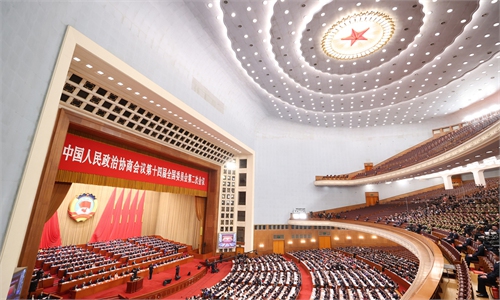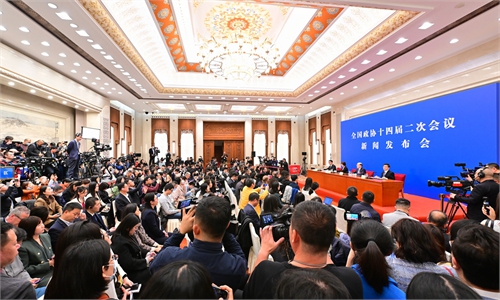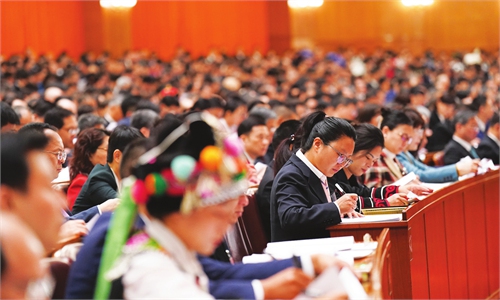CPPCC wraps up annual session, Chinese modernization in focus
Broad discussions foster solidarity, offer effective suggestions: expert
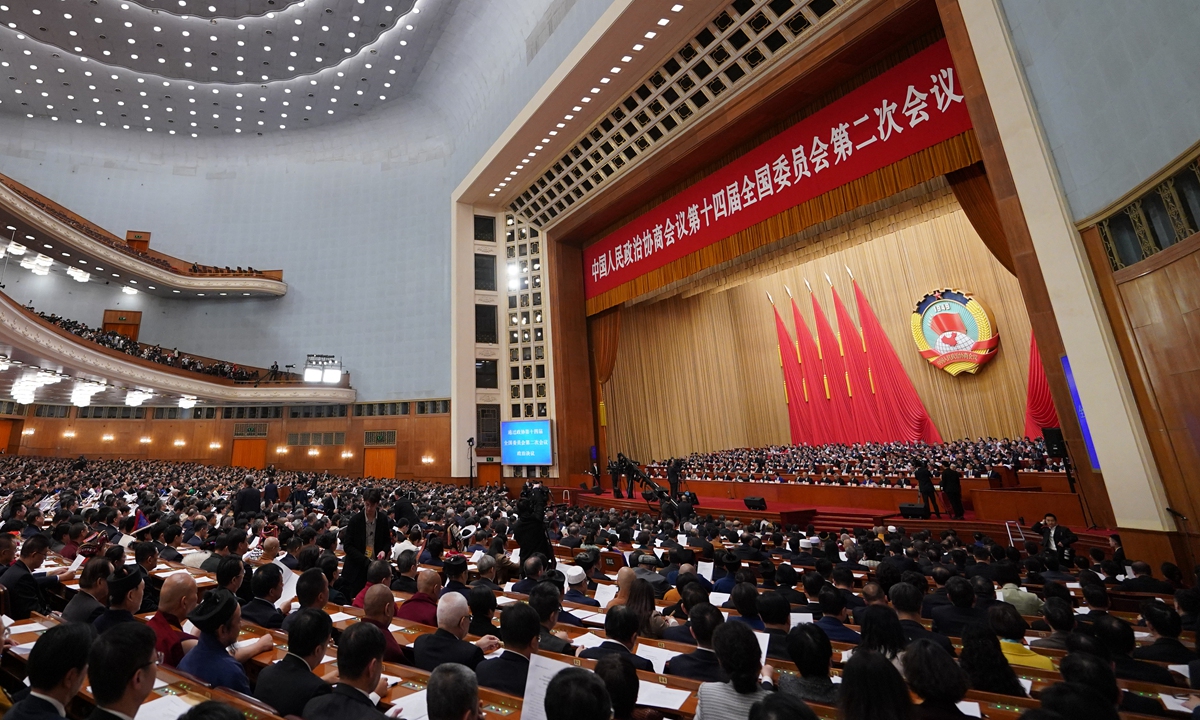
The closing meeting of the second session of the 14th National Committee of the Chinese People's Political Consultative Conference (CPPCC) is held at the Great Hall of the People in Beijing on March 10, 2024. Photo: VCG
China's top political advisory body held its closing meeting on Sunday morning. At this year's two sessions, political advisors engaged in effective and pragmatic discussions on a range of topics, both long-standing and newly emerging ones, including strategies for advancing the development of AI and enhancing employment opportunities.
The collaborative efforts of Chinese national political advisors help foster a sense of solidarity and consensus among society at large. These discussions resulted in suggestions from advisors that address a wide array of issues, from national development to everyday concerns, and help encourage collective action within society to overcome challenges.
The second session of the 14th National Committee of the Chinese People's Political Consultative Conference (CPPCC) held its closing meeting on Sunday morning.
A resolution on a work report of the Standing Committee of the CPPCC National Committee, a resolution on a report on how the proposals from political advisors have been handled since the previous annual session, a report on the examination of new proposals, and a political resolution on the second session of the 14th CPPCC National Committee were approved at the meeting, the Xinhua News Agency reported on Sunday.
Wang Huning, chairman of the CPPCC National Committee, delivered a speech at the meeting.
We should improve our political stance to have a better understanding about the Chinese modernization under the leadership of the CPC, Wang said.
Wang stressed the need to make "high-quality suggestions" to promote Chinese modernization and improve the body's capability of discussing state affairs.
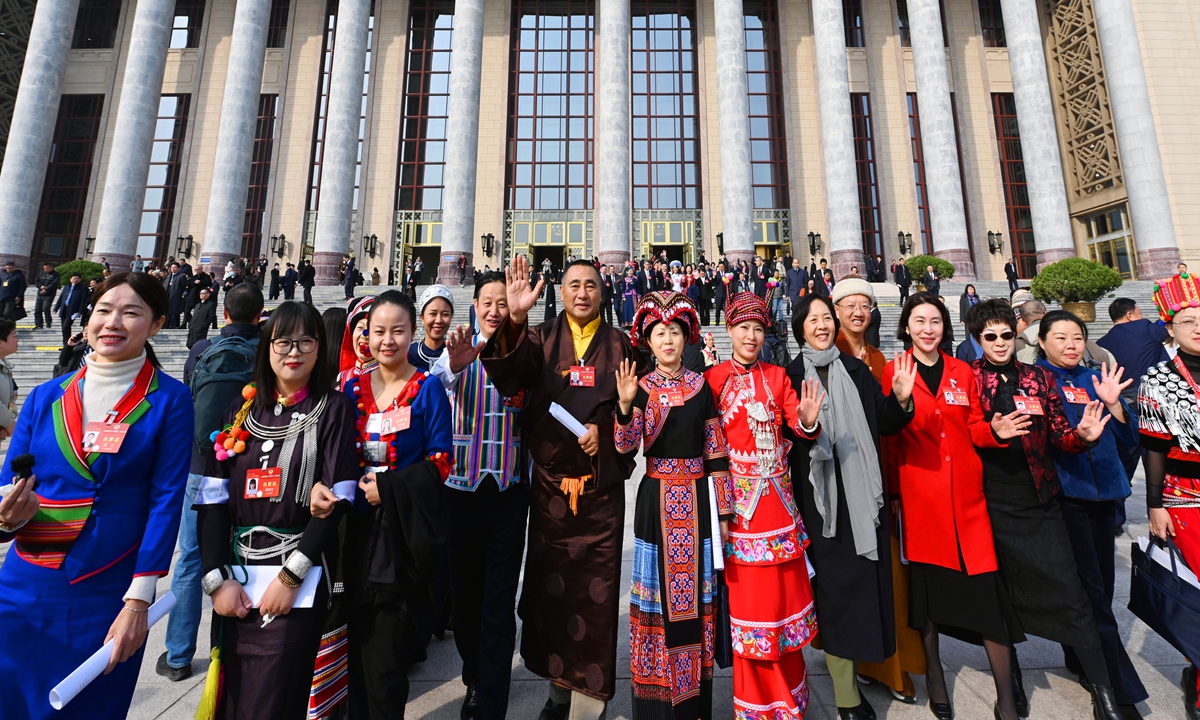
Members of the 14th National Committee of the Chinese People's Political Consultative Conference (CPPCC) take photos in front of the Great Hall of the People in Beijing on March 10, 2024. The closing meeting of the second session of the 14th National Committee of the CPPCC was held on the same day. Photo: VCG
Focus on modernization
The CPPCC is an important platform to channel people's expectations to the decision-making body, by submitting advice for the government to address topics ranging from livelihood issues to the country's high-quality development, Zhang Yiwu, a professor at Peking University and national political advisor, told the Global Times on Sunday.
Many proposals from political advisors this year focused on pushing China's modernization in various aspects.
The development of new quality productive forces is currently gaining momentum in China. Yang Jie, chairman of China Mobile and a member of the 14th National Committee of the CPPCC, suggested to the Global Times that the country boost the "AI+" campaign at the national level by strengthening top-level design and clarifying development goals and key tasks, in order to give full play to the huge potential of AI in achieving leapfrog development of technologies, industrial upgrading and productivity.
Zhang said there is a special focus on topics such as AI, digitization and other emerging issues that will impact the future development trends of Chinese society. The level of attention on these topics in China is even higher than in the US, Zhang said.
However, attention continues to be placed on some long-standing issues, such as boosting the birth rate, helping poor areas develop and boosting youth employment. The problem of how to provide solutions to those old problems in the new environment has prompted many suggestions and proposals from political advisors, Zhang said, noting that the atmosphere from top to bottom has been very pragmatic and emphasized effectiveness.
Liu Jieyi, spokesperson for the second session of the 14th National Committee of the CPPCC, said at a press conference on March 3 that the National Committee of the CPPCC will conduct a wide range of work including improving the support system for graduate employment, conducting more studies on job market stability, and improving and optimizing a lifelong vocational training system in 2024.
Build consensus
In his speech at the meeting, Wang stressed that the CPPCC must consciously promote the great unity of the Chinese people, mobilize all positive factors that can be mobilized, and unite all forces that can be united.
The political resolution passed on Sunday called on CPPCC members to study and implement the Party's overall strategy for solving the Taiwan question in the new era, unite all patriotic forces that can be united, deepen integration and development in various fields across the Taiwan Straits, and jointly promote the process of "peaceful reunification" of the motherland.
On further strengthening integration across the Taiwan Straits, Fu Zhiguan, the vice chairman of the Central Committee of the Taiwan Democratic Self-Government League and a national political advisor, suggested to media to promote economic and trade cooperation between the island of Taiwan and the Chinese mainland by better connecting the island's land, sea and air transportation infrastructure, such as increasing more direct flights between cities, and building passenger and cargo ports and logistics bases to enhance convenience.
The resolution vowed to comprehensively, accurately, firmly and unwaveringly implement the principle of "one country, two systems," of "Hong Kong people governing Hong Kong," "Macao people governing Macao," and a high degree of autonomy.
It also vowed to promote harmonious political party relations, ethnic relations, religious relations, class relations, domestic and overseas compatriots relations, and consolidate and develop the broadest patriotic united front.
Uniting the whole society plays a crucial role in accomplish our current task of achieving social development, Zhang said, noting that the issues concerning Chinese society need to be fully discussed and understood by everyone in society, in order to overcome these problems as well as remove the obstacles that cause them.
By doing so, we can create a better environment and ensure a smoother development of both the economy and society, he said.

